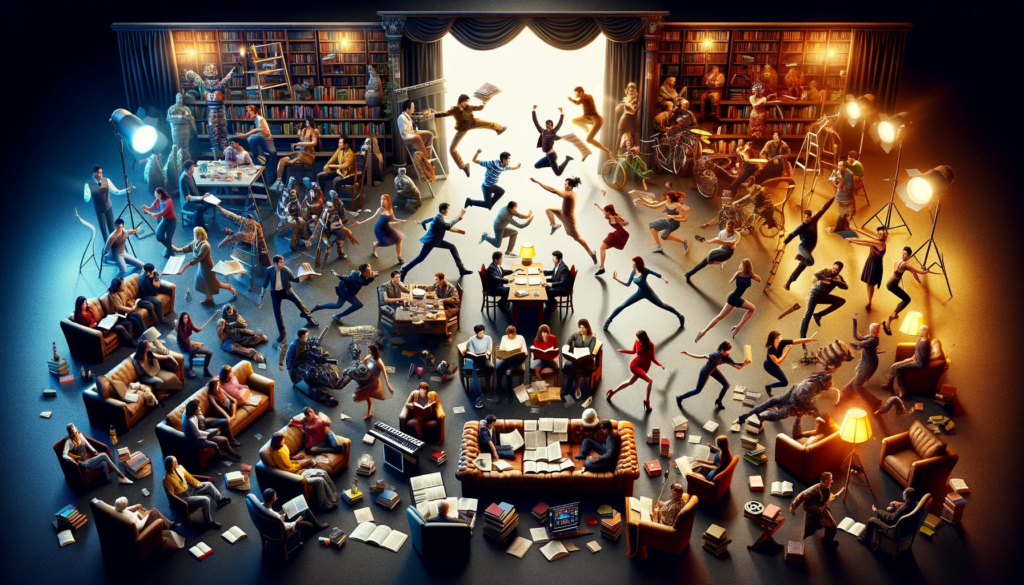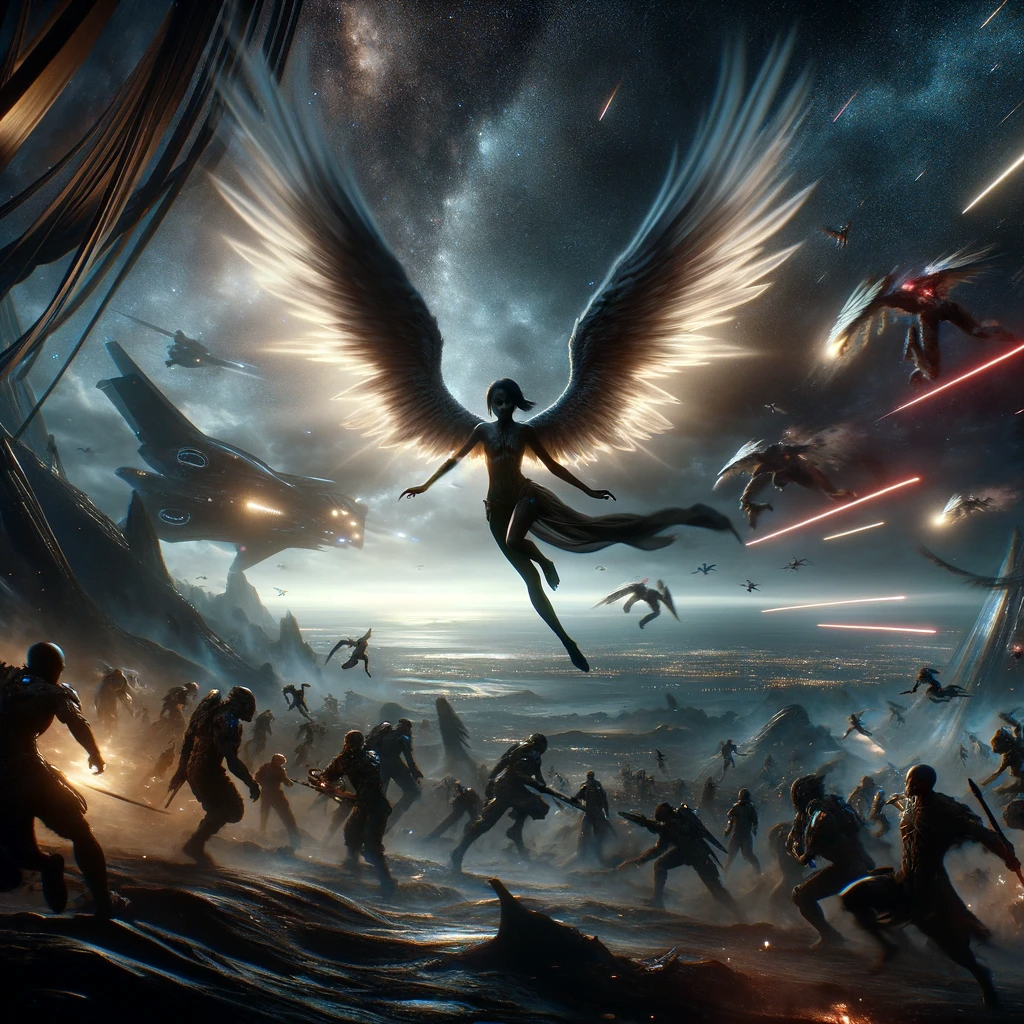Dan Brown published his The Da Vinci Code in 2003. Many people found it a thrilling page-turner. Fast-paced plot? Yep. Code-breaking puzzles? You bet. Art, religion, and conspiracy? In there too. It became a best-seller, spawning a Hollywood adaptation starring Tom Hanks.
In 1965, Frank Herbert published Dune. It was arguably both groundbreaking and intricate, with McMassive world-building, political intrigue, and (well before we woke up to the need) eco-warrior themes. It’s regarded as a classic, also cranking out a (fucken superb) Hollywood adaptation (in three parts, two of which we’re still waiting for, Denis!).
Blade Runner, one of my all-time favourite cyberpunk movies, and arguably what started me on the path to write Chromed: Upgrade, hit the streets in 1982. It’s a Ridley Scott masterpiece, with deeply thought-provoking and often disturbing themes, dystopian atmosphere, and (lest we forget) Harrison Ford’s performance as Rick Deckard. It’s a marvel.
Hang about, Richard, I hear you say. What the actual fuck does this have to do with Rebel Moon?
Good Q.
- The Da Vinci Code found criticism from, uh, more discerning readers, who found the prose simplistic, characters clichéd, and had their Tourette’s triggered with historical inaccuracies. Arguably, the book’s success came from entertainment value rather than literary merit. Hold onto this thought.
- Dune was littered with fairly oblique prose and extensive terminology. I personally disliked the head-hopping in scenes, despite loving the book overall. Combined, this meant some readers struggled to get into Herbert’s universe, bouncing right off the personal energy shielding.
- And Blade Runner was criticised for being slow-paced and overly philosophical. People got themselves wound around the axle about Deckard’s true identity. And let’s not forget the different versions of the film and which one is the one true ring to bind them all.
Back to Rebel Moon. When I saw the trailer, I wanted a piece of that. My wife wanted to give the piece back on the strength of the trailer alone – she was like, “There’s too much shit going on in there.”
When I finally watched the movie, I was … not impressed (…Zach is going to sleep just fine, I assure you). I turned to IMDb; at the time, the reviews were deeply skewed towards either 10s or 1s (…since normalised, with a weighted average of 5.6 at time of writing). The first wave of reviews looked like this:
- 10! Best thing I’ve seen in my life! Wow! Masterpiece! Cinema will forever be changed by Zack Snyder’s vision! All hail the movie’s brilliance!
- 1! Worst thing I’ve seen in my life! Holy shitballs but was this designed by committee? Did anyone spend time on writing characters or story? I want 2 hours of my life back.
Rebel Moon wasn’t the worst thing I’ve seen in my life, but I did find … room for improvement. It’s popular to hate things on the Internet; it’s less popular to discuss why something might be good or bad, depending on where you’re at.
There are spoilers below.

Why It’s Good
Rebel Moon is a highly produced movie. It’s evident they put the cash down; the effects are top-tier, and there’s no shortage of set pieces (ice lake to desert, star ship to spacer bar, everything’s there).
Action is highly cinematic. People get their ninja on when going toe-to-toe. Cirque du Soleil would be impressed at the part where a dude jumps from a cliffside to land on a … griffon? Flying lion? Is it a bird? Fuck if I know, but it’s a well-done shot.
Characters are flashy. The first time we see Sofia Boutella’s Kora in action, we know she is purpose-built to clean your clock. The space pirate at the bar is space piratey. Djimon Hounsou’s Titus is suitably down on his luck and just pissed off with your bullshit.
The sound stage delivers as well. The guns have weight. The sword clashes ring. It’s all there.
And … they chose their actors well. From Boutella’s lean and capable elegance to Hounsou’s rugged-yet-slightly-sagged exterior, these people were built for the roles. I did wonder at what point what the set smelled like, because it was clear there were a lot of people on a high protein diet for the making of this flick.
Remember The Da Vinci Code and how it succeeded on entertainment value? This is squarely where Rebel Moon is at. It wants to entertain you, and I suspect ol’ Zach knows that CGI entertains well enough, especially for a Netflix audience who are struggling to stretch their entertainment dollar.
So, why the 5.6? Let’s dig in.
Why It’s Bad
It’s probably no surprise coming from a guy who writes action stories with heart, but I need to start with the characters. If I hadn’t looked at the IMDb page, I wouldn’t be able to tell you Hounsou’s character’s name; aside from Kora, they weren’t memorable. It’s not until quite late in the piece we discover Staz Nair’s Tarak is actually royalty, but are given no context for that at all.
Because there’s so much going on (ref: my wife’s wisdom, above), none of the characters (aside from Kora) have space to breathe. I’d love to know more about Nemesis. What’s the story behind Darrian (who has arguably one of the best voices in the universe) and Devra? And why, for all that’s holy, do we have Sir Fucking Anthony Fucking Hopkins voicing a deeply intriguing character at the start of the movie who is a) never explained and b) vanishes for all intents and purposes for the rest of the movie?
The movie also squanders some of its talent. Jena Malone played one of the cooler characters in the Hunger Games’ series; her Johanna Mason was bitchy, snarky, and badass. In this movie she is … well, mostly just put in a CGI character and gets to snarl a lot, with a fairly trite skein of plot holding a fight scene together.
Most characters don’t do much, and when they do, you wish they did more. That fight scene with Malone? Everyone’s there, just kind of standing at the back of the room and waiting for it to be over. Considering it’s to do with the death of a child and a horrible monster, I feel a little more enthusiasm for violence would have gone a long way.
The plot itself is paper thin, and something you’ve seen a thousand times before. There’s nothing too wrong with this if done well, but I think you need to go through the motions of excellence. An for-example would be Charlie Hunnam’s Kai, who I knew would betray them from the moment he stepped on screen. I also knew (because he’s a lovable rogue) he wouldn’t fuck ’em over until right at the end.

So, What Does This Mean?
It means Rebel Moon is a movie made for a specific audience, and that audience probably isn’t you (or, not completely you). It’s difficult to call the entire structure objectively good or bad, but it’s quite straightforward to see whether you’d like it. Here is a simple quiz.
- Do you like story-rich, character-centric movies? Probably not for you.
- Do you like action-heavy, set piece extravaganzas with high production value? Don’t mind putting your brain in a jar for two hours? Probably worth a watch.
Rebel Moon is, to be a wanker about it, a dichotomy of cinematic achievement. High production values, stunning visuals, and great action deliver. It’s a bit of fun for your eyes and ears, and you’re not going to spend a lot of time trying to work out where the CGI starts and ends; the filmmaking and underlying tech are great. But – and everything before the ‘but’ is a lie – it really stumbles in its narrative depth and character development. If you’re after a drink of water made of compelling story, you’ll leave thirsty.
I reckon it’s not about the spectacle, but the missed opportunity the movie presents. Perhaps that part 1+2 nature works against it? The pacing and structure we might see in a longer movie (or two delivered in one bite) could have turned this around. We’d get our spectacle while being engaged in a layered, paced story.
The epitaph of Rebel Moon might well be that the marriage of style and substance is tricky to stick the landing on. It’s a tough balance.
There’s a glimmer of hope the sequel (“Part Two”) might address some of these … areas for improvement. A more intricate plot, or at least seeing the plot enriched? The characters getting more time to shine now we’ve been introduced? A more nuanced story than, “Evil empires are bad?” It could all happen; I didn’t think Lucas would stick the landing on Anakin’s fall in Revenge of the Sith, but if he managed it, anything’s possible.
Personally? I think it’s a bad movie. I’m not writing off the sequel just yet, but you know, I just don’t think we’re going to be that lucky. I think the story will finish much as it started; flashy, sometimes fun, but ultimately flawed in depth, development, and personality. In a years’ time, no one will remember the Rebel Moon movie duo.
(We will see what the fuck is up with Jimmy, though).
If you enjoyed this post, check out my email list.
Discover more from Parrydox
Subscribe to get the latest posts sent to your email.